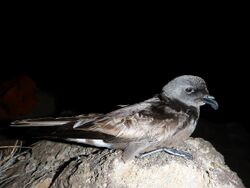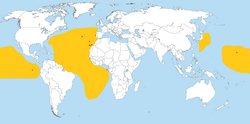Biology:Band-rumped storm petrel
| Band-rumped storm petrel | |
|---|---|

| |
| Scientific classification | |
| Kingdom: | Animalia |
| Phylum: | Chordata |
| Class: | Aves |
| Order: | Procellariiformes |
| Family: | Hydrobatidae |
| Genus: | Hydrobates |
| Species: | H. castro
|
| Binomial name | |
| Hydrobates castro (Harcourt, 1851)
| |

| |
| Synonyms | |
| |

The band-rumped storm petrel, Madeiran storm petrel, or Harcourt's storm petrel (Hydrobates castro) is of the storm petrel family Hydrobatidae.
Description
The band-rumped storm petrel is 19–21 cm in length with a 43–46 cm wingspan, and weighs 44–49 g. It is mainly brownish black with an extensive white rump. Similar to Leach's storm petrel with the forked tail, long wings, but Leach's has a more deeply forked tail, a differently shaped (V-shaped or triangular) white rump, and a 'tern-like' flight, whereas the band-rumped storm-petrel has a more 'shearwater-like' flight.
Distribution
The species breeds on islands in the warmer parts of the Atlantic and Pacific Oceans. These include the Berlengas (a few tens of kilometres off mainland Portugal), the Azores, Madeira, Canary Islands and Saint Helena in the Atlantic, and in the Pacific off eastern Japan , on Kauai, Hawaii, and on the Galápagos Islands.[2] In 2016, the species was reported to have also started breeding on the Mauna Loa volcano on the island of Hawaii.[3]
Behaviour
Breeding
Birds nest in colonies close to the sea in rock crevices and females lay a single white egg per breeding attempt. The band-rumped storm petrel spends the non-breeding period at sea. It is strictly nocturnal at its breeding sites to avoid predation by gulls and diurnal raptors such as peregrines, and will even avoid coming to land on clear moonlit nights. Like most petrels, its walking ability is limited to a short shuffle from/to the burrow.
Feeding
Individuals feed by picking up prey items (invertebrates, small vertebrates and sometimes carrion) from the water surface. A study aiming to determine the diving abilities of this species [4] was actually conducted on the 'warm season' population from the Azores, which was later recognized as a distinct species (see below).
Taxonomy
Recent discoveries of 'cold season' and 'warm season' populations, which use the same nest sites at different times of year, and also differ in terms of vocalisations and moulting period, may hint at the existence of two 'cryptic species' within the currently understood limits of the species. After population genetics analyses of mtDNA, the warm season population in the Azores was recognized as a separate species, Monteiro's storm petrel.[5]
It was formerly defined in the genus Oceanodroma before that genus was synonymized with Hydrobates.[6] It is monotypic, but the names cryptoleucura and bangsi (see above synonyms) were each formerly regarded as separate subspecies.[7]
Footnotes
- ↑ BirdLife International (2018). "Hydrobates castro". IUCN Red List of Threatened Species 2018: e.T132341128A132433305. doi:10.2305/IUCN.UK.2018-2.RLTS.T132341128A132433305.en. https://www.iucnredlist.org/species/132341128/132433305. Retrieved 13 November 2021.
- ↑ "Band-rumped Storm-petrel". IUCN Red List of Threatened Species 7 August 2018. 7 August 2018. https://www.iucnredlist.org/species/132341128/132433305. Retrieved 5 November 2020.
- ↑ "Band-rumped Storm-petrel Nests Found on Mauna Loa - Island Conservation" (in en-US). Island Conservation. 2018-01-04. https://www.islandconservation.org/nesting-sites-hawaii-endangered-storm-petrel/.
- ↑ Bried, Joël (2005): Diving Ability of the Madeiran Storm Petrel. Waterbirds 28(2): 162–166. DOI:10.1675/1524-4695(2005)028[0162:DAOTMS]2.0.CO;2 HTML abstract
- ↑ M. Bolton, A.L. Smith, E. Gomez-Diaz, V.L. Friesen, R. Medeiros, J. Bried, J.L. Roscales & R.W. Furness (2008) "Monteiro's Storm Petrel Oceanodroma monteiroi: a new species from the Azores" Ibis 150 (4): 717–727 doi:10.1111/j.1474-919X.2008.00854.x
- ↑ "Taxonomic Updates – IOC World Bird List" (in en-US). https://www.worldbirdnames.org/new/updates/taxonomy/.
- ↑ Howard, Richard and Alick Moore. A Complete Checklist of the Birds of the World. 2nd edition. Academic Press, 1991
References
- Snow, D.W. & Snow, B.K. (1966). "The breeding season of the Band-rumped Storm Petrel (Oceanodromo castro) in the Galapagos." Ibis 108(2):283-284.
External links
- Madeira Birds - Madeira Storm-Petrel
- UMCP Galápagos 2004 (University of Maryland, College Park) – photos of birds at sea
Wikidata ☰ Q1062575 entry
 |

